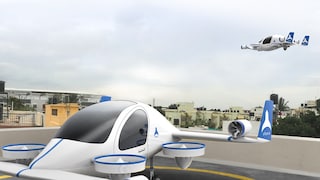Reported By: Bhaswati Guha Majumder
Edited By: Nitya Thirumalai
News18.com
Last Updated: March 07, 2024, 11:56 IST
Chennai, India
Professor Chakravarthy addressed concerns regarding potential failures in critical components, emphasising the aircraft's ability to maintain lift and stability even in adverse conditions. (Special arrangement/News18)
Nothing is excessively futuristic considering the pace of technological advancement worldwide. With this in mind, Professor Satya Chakravarthy, the founder of ePlane Company and a distinguished professor of Aerospace Engineering at the Indian Institute of Technology Madras (IIT-Madras), highlighted the ground-breaking progress achieved in developing India’s first flying taxi — e200.
In an exclusive interview with News18, Prof Chakravarthy addressed various aspects of the e200’s design, safety, regulatory considerations, and its potential impact on urban transportation.
The project embarked on a mission to overcome significant technical and logistical challenges to realise a compact, efficient aircraft capable of navigating the complexities of India’s bustling urban landscapes. Prof Chakravarthy said: “We had to make the aircraft very compact so that we can land in tight spaces, fly over crowded skies in India. We want to cover short distances multiple times over before we have downtime for charging the battery.”
Despite the formidable hurdles, ePlane has achieved significant milestones, including successful test flights of a subscale prototype, the e50. Professor Chakravarthy provided a glimpse into the timeline for completing the full-scale prototype and anticipated the maiden flight in October-November, marking a historic moment in India’s aviation landscape.
Ensuring passenger safety remains a paramount priority for ePlane, with Professor Chakravarthy explaining a multifaceted safety strategy designed to mitigate potential risks. He emphasised the rigorous adherence to stringent international standards, highlighting the need to showcase failure rates ranging from 1 in 10 million to 1 in a billion across various components and subsystems.
He Chakravarthy underscored the comprehensive approach to reliability, emphasising the importance of proving the aircraft’s ability to withstand extreme conditions and potential failures.
In detailing the safety features of the e200, the professor outlined multiple layers of redundancy aimed at safeguarding passengers in diverse scenarios. He emphasised the role of redundant systems, including emergency measures such as parachutes and inflatables, to ensure a soft landing in the event of an emergency. Additionally, he highlighted the integration of advanced technologies, such as vertical rotors and aerodynamic design principles, to enhance stability and control during flight.
Moreover, Chakravarthy addressed concerns regarding potential failures in critical components, emphasising the aircraft’s ability to maintain lift and stability even in adverse conditions. He explained the redundancy built into the design, whereby both the wings and vertical rotors can independently support the aircraft’s weight, providing additional layers of safety in case of emergencies. By meticulously addressing potential failure scenarios and implementing robust safety measures, ePlane aims to instil confidence in passengers and regulatory authorities alike, ensuring the utmost safety and reliability of its flying taxi service.
Even if the safety is top-notch, navigating regulatory landscapes may pose inevitable challenges. But Prof Chakravarthy showed confidence in ePlane’s ability to navigate through the process strategically. He acknowledged potential operational restrictions in congested urban areas initially but outlined a phased approach to expand operations based on safety performance and regulatory compliance. “The regulations are essentially a pathway for us to get to the market,” he noted.
However, this so-far-so-good idea of flying taxis still sounds a bit futuristic and premium, which may make people uncomfortable thinking of a premium price tag. But as per the IIT professor, affordability and accessibility will emerge as pivotal factors shaping the potential widespread adoption of ePlane taxis.
Professor Chakravarthy envisioned offering services at just double the fare of traditional ride-hailing services like Uber, promising significant time savings for passengers.
In terms of looking beyond India, he also envisioned the global resonance of e200’s technology, citing its affordability and operational convenience as competitive advantages in international markets. But he also acknowledged potential challenges in navigating foreign regulations.
“We can cut the international competition in terms of cost. That is not a problem. But, in aerospace, we will have this problem of ‘Not Invented Here Syndrome’. There is national-level protectionism that happens in aerospace…. (and because of foreign regulations for flying) their citizens will actually be deprived of the benefit of a lower cost offering that we will have,” he noted.
However, in a testament to ePlane’s commitment to offer this innovation, Chakravarthy highlighted strategic partnerships as key enablers in bringing this transformative technology to market. He outlined plans to collaborate with design organizations for computational fluid dynamics or finite element analysis, manufacturing partners, and software developers. Additionally, he highlighted the need for infrastructure-related partnerships for operational excellence that include real estate or landing site maintenance organizations, and charging infrastructure.
This is because the project plans to utilize existing helipads, followed by expanding to locations such as parking lots, metro station rooftops, and large building rooftops, including offices and apartments, to facilitate take-off and landing in public and private spaces. Chakravarthy stressed on the importance of establishing multiple landing sites across urban areas to ensure accessibility and meet demand effectively.
Professor Chakravarthy’s insights offer a comprehensive understanding of the innovative strides made by ePlane in developing India’s first flying taxi. With meticulous planning, technological innovation, and a steadfast commitment to safety and accessibility, e200 hopes to begin a new era of urban mobility, not only in India but also across the globe.
